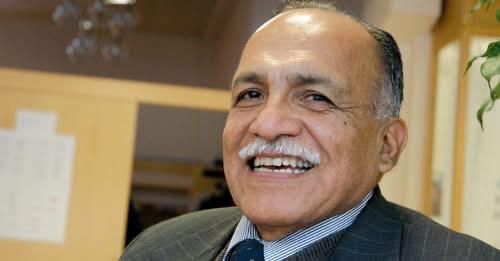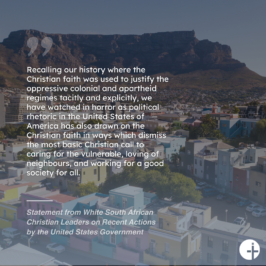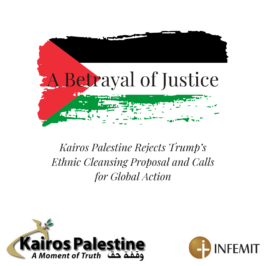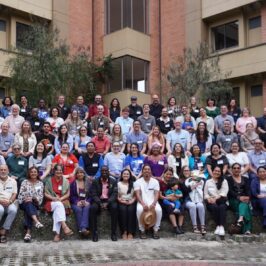English transcript
Good afternoon, my name is Martin Munyao. I am a lecturer at Daystar University in Nairobi,
Kenya. I teach in two departments. I teach in the department of Theology and Pastoral Studies, but I also occasionally do teach in the department of Peace and International studies, especially theologically related courses regarding peace building. And I’m so glad to be invited on this Stott-Bediako forum to present a paper, and my paper this afternoon is entitled, “Whiteness in Christianity and Decoloniality of the African Experience: Developing a Political Theology for ‘Shalom’ in Kenya.
Now, historians have held that colonialism and western missionary enterprise were two distinct and unrelated entries to pre-colonial Kenya. How then did christianity for decades live side by side with colonialism? I contend that colonialism in Kenya could not have been posited without the missionary enterprise activity. The impact of that unholy relationship is felt and sustained in contemporary forms of violence.
Land for example is a present source of conflict in Kenya. In the pre-colonial African ontology, the land was in harmony with the people. For the land to be taken away from its owners, a form of separation of the people from the land had to happen. And this was facilitated by a Christian theology that created existential dualism, violently separating the African bodies from their souls and the person from the community. Hence Christian doctrine that emphasized ‘saving souls’ and ‘personal salvation’ was entrenched, deeply entrenched. This separation and fragmentation are fundamental to whiteness. Whiteness universalizes truth, even theology; it puts a face of neutrality that obscures specificity. Such has made the church uncritical of oppressive and unjust political structures.
Whiteness realizes that it’s hard to enter into something that is in harmony, something that is united, something that is one. Therefore, separation needs to happen for whiteness to succeed. Unfortunately much of our theological understanding today is tampered with a neocolonial mindset that separates the soul from the body for Christian triumphalism. It anesthetizes the pain of oppression with the eschatological promise of future deliverance.
This paper will analyze the impact of whiteness in Kenya during and after colonialism to demonstrate how the British explorer settler missionary alliance oiled the religious and economic disenfranchising of African people. Secondly, it proposes a political theology that will restore ‘Shalom’ in a socially, economically, and spiritually broken country. It is such a theology done in Africa, that will confront oppressive structures and identify with the marginalized communities in Kenya. So in opening, let me begin by introducing my paper by defining what whiteness is.
What is whiteness? So whiteness does not necessarily carry racial connotations even though they are related. When talking about whiteness, the implication is not a White versus Black or Latino or Asian racial identity. Rather, Whiteness is a way of life that finds wings to thrive in the world through politics, economics, and Christianity. For every Christian in the world to find their Christian story is to find themselves in Whiteness. Whiteness as a way of life positions itself as superior to other ways of life in domineering over other cultures. When it comes into contact with other cultures, it almost always wins. Therefore, Whiteness in Christianity supposes
a Christian supremacy over world cultures and religions.
According to Jennings in his seminal work, “The Christian Imagination,” there is a particular moment in history when Christianity became White. He argues that this happened during colonialism where African people were subjugated (Jennings, 2010). In agreement with Jennings, it is important to underscore that colonialism in Kenya was neither incidental nor adjacent to the Western missionary enterprise of the 19th and 20th centuries. Rather, the two were intricately linked. It is therefore incorrect to see mainstream Christianity today in Kenya is constrained by the external politicization of religion. In fact, during the colonial period in East Africa at large, the two were part and parcel of the same project. Christianity gave the colonial agenda spiritual wings to succeed, while colonialism energized Christianity’s expansionist movement and mission to the unreached people groups.
The white missionary enterprise of Christianity in the 19th and 20th centuries in foreign territories was an expansionist initiative of Whiteness. This expansionist attitude is Whiteness in nature. It sought to explore, conquer, and convert new lands for God. As various missionary associations expanded, they penetrated and separated human societies abroad to subdue, uproot indigenous religions and societies, and entrench a new faith. The new faith is what has now been inherited through various mainstream Christian denominations in Kenya and parts of Africa, which have an attachment to their missionary patrons in overseas. These have been called the missionary or mainstream churches. The mainstream churches in Kenya have thus inherited a white theology that is laced with colonial and capitalist baggage that is inextricably related or linked with the politics of the state. Therefore, even though mission churches in Kenya are independent of their Western counterpart in terms of leadership, Whiteness continues to drive their theology and missions. This paper is not interested in invoking guilt on anyone, or blame-shifting. Rather, the paper seeks to ask the question of ‘what do we do with
what we have inherited?’
Let me start by analyzing that by talking about whiteness and theology. It has been mentioned earlier in this paper that whenever Whiteness comes into contact with any other culture, it always wins. Whiteness interacts with other cultures, alters their DNA, yet it is left unscathed by the cultures it comes into contact with. This reality has huge implications on Christian theology. James Jennings traces the theological foundations of colonialism, which was at its core, was a form of evangelization . When missionaries came to Kenya, they placed themselves at the juncture of the known and the unknown. Kenyans in their respective communities had an idea of God, albeit no concrete theology to describe what they believed in. The African religious reality was real and alive. But Whiteness by nature does a few things, or did a few things. It not always wins, but also universalizes and normalizes yet leaving itself cloaked in neutrality. Therefore, its theology is just theology. The rest are either Black, Latino, Liberation, Feminist, etc. theologies. By implication, white theology which is not identified as White is the universal standard. Whiteness becomes the norm with which other cultural identities are evaluated (Hill, 2018).
This tendency to normalize Whiteness has huge implications on both theology and global missions today. The mainstream churches have inherited a theology that is highly colonial and replete with Christian triumphalism. This means that the evangelical message, even though biblical had to be fundamentally laced with Whiteness. How has Whiteness managed to be successful in doing this? For Whiteness’ success to disenfranchise the Kenyan people, it had to be fragmental by nature. Remember that I said earlier, that it is hard to enter into something that is in harmony. So Kenyan societies are collectivistic, they are communal, and closely attached to their land. There was an inseparable union between Kenyans and their land, it has always been like that. For colonialism to divide and conquer, to balkanize people in their ethnic identities, the evangelistic message had to precede colonialization and establishment of British protectorates.
In obedience to The Great Commission that is stipulated in Matthew 28:16, the church is to go into the world and make disciples of all nations, and the word there is ethnē, for nations. Hence the relationship between witness and ethnicity is of the utmost importance when considering mission. So, the white missionaries had to approach Kenya’s indigenous communities with a gospel theology that separates the body and the soul, without the subjugation of various ethnicities in the colonial enterprise. So without that happening, this could not have been possible. The theology that accompanied the Great Commission was that of confession of sins, call to repentance, and salvation of souls, which are important to do. The implication of this separation of the body and soul, and the body and the land will be discussed later. For now, here’s a look at that theology, the sin and salvation doctrines which were entrenched in Western theology and replicated by missionaries in Kenya to this day.
Let me start off with the sin doctrine. As mentioned earlier, the African communities are usually collectivistic with a group-oriented view or approach to everything, including virtues. So being an honor-shame context, Kenyans view sin differently from the Western worldview. Despite the growing prominence of honor in social theories and the emergence of Christianity in honor-shame cultures, the notion of honor remains absent from theological discourse. In the Western worldview, sin is understood as breaking the law, breaking God’s law and something that people do. However, sin in the African context, an African worldview which is highly shame-based is not a law that people break, it is actually who we are at the core of our being. It is not something that you do, but something that you are. In fact, in some African societies, sin is not a sin until one is caught. Therefore, from the onset, the missionary’s explanation about sin was completely misplaced in the African context and worldview and ontology. Sin is breaking the law as understood by Western missionaries was abstract and only appealed to one’s guilt.
For the missionaries to succeed in entrenching such a legal oriented doctrine, they had to normalize a gospel presentation that emphasized on forgiveness of sin, the redemption of souls, and the heaven/hell destiny that appealed on guilt and not on the shame of sin. But Kenyan societies are shame-based and their understanding of sin is different. Shame-based societies such as Kenya is are communal in terms of set up. Because of communal dynamics, sin not only besmirches Adam’s reputation but also affronts God’s honor. The most common expression of human sin is the construction of false status via religion or social codes. Such social engineering degrades others, it rejects the honor God graciously grants, and upstages God as a true arbiter of honor. By definition in the Kenyan context, sin is the integrated process by which our shameful behavior invokes shameful feelings, defaming one’s character and status hence dishonoring God.
So Western missionaries coming from a heavily guilt-oriented background failed to recognize and understand the African worldview and imposed a truncated gospel that emphasized on the guilt of sinners and forgiveness of sins. When sin becomes what we do and not who we are, then that creates a discipleship deficiency on the new converts who come from shame-based cultures. Consequently, missionaries and their white settler counterparts could take Kenyan land and not be perceived as sinners. In that dichotomization of sin as not being who one is, and reducing to what one does, consequently separated the soul from the body. This was even made worse in the articulation of the concept of salvation through the Western lens, which is what I’m going to talk about next- the doctrine of salvation.
The Western missionary enterprise also articulated a Salvation doctrine in terms of foreign to the recipient Kenyan cultures. Christian evangelists, teachers, and missionaries have focused on law, sin, and guilt and proclaimed the need for repentance and forgiveness. These are important Christian teachings and should be taught, I’m not underscoring that fact. However, Nicholls critiquing his fellow missionary enterprise lamented on the failure to “stress salvation as honoring God, exposure of sin as shame and the need for repentance and acceptance and the restoration of honor” (Nicholls, 2001, p. 232). In honor-shame cultures, salvation is not necessarily understood through the legal, but rather a regal lens. Salvation is easily conceptualized as adhering to social expectations and respect for communally accepted standards without which, one is shamed and cast out until they are restored or rather, saved, in the community.
But the missionary’s insistence and focus on salvation of souls led to the common rhetoric of counting of souls saved as a measure of mission success. So whenever missions was done in here, a number of souls came to Christ. But where are the bodies? This separation and fragmentation of bodies and souls are fundamental to Whiteness. And thus, white missionaries needed to separate the soul ofAfricans from their bodies hence a gospel that ‘their souls will be saved.’ One needed to constantly needed to separate their life even when it didn’t make sense. Salvation in the missionary enterprise efforts pushed and continues to perpetuate that idea that all that matters is your salvation. When this idea is repeated and normalized as that is what Whiteness does and did and continues to do, it alters one’s understanding about pain from oppressive structures for example, by numbing the Christian oppressed with the promise of an eschatological utopian future as packaged in the western missionary’s gospel message. Such a gospel failed to address the here and now of human existence in the Kenyan context and also failed to address African realities.
Whiteness makes universal claims of what is needed. It claims a universal understanding of what is needed, what is beautiful, what is normal, and what is acceptable. This means that there are theologies or a theology that is acceptable, that is normal, that is universal in standard. Whiteness puts a face of neutrality that obscures the specific theologies of other people. That is why you find that even today in sub-Saharan Africa, Christianity is surging more than anywhere else in the world according to Jenkins, yet Africa harbors some of the most corrupt countries in the world according to the annual corruption indices. The relationship between the Church and state has allowed for corruption and oppression passing unchecked, and sometimes in the name of God. Unfortunately, much of the Christianity in Kenya today is a supremacy movement ‘for God’. The theological understanding of missions still carries the colonial baggage of Christian triumphalism. This ought to change as God has a special preference for the poor, the displaced, oppressed, and downtrodden as we see in the book of Luke, chapter 4. When people living in oppressive situations read the scriptures, they ought to find freedom in the world that Jesus lived in and freedom in their own world. Let me now talk about Whiteness and land.
The European settler-farmers started arriving in Kenya as a colony for large-scale farming, a move that went hand-in-hand with land acquisition and the creation of “White Highlands.” The unholy alliance between the White settler, the missionary, and the colonial government allowed for the loss of indigenously owned land by Kenyans to the colonial powers. The said unholy alliance was between European settler-farmers and missionaries – for example, the Anglicans, Presbyterians and/or the Protestant wing in particular – in 20th century Kenya according to Gathogo. This empire-missionary relationship oiled a revision on land policies which allowed for massive white settler ownership of land while Kenyans were turned into squatters on their own land. For example, the commissioner of the protectorate was mandated by the Acquisition Act to appropriate a mile on either side of the railway for settler-farms to attend to the seemingly idle land and eventually pay tax. Later, this Act promulgated the East African Lands Order which “legally” guided these land seizures that followed after the building of the railway, from 1896 to 1901 according to Gathogo. Gross violations proceeded, of human rights, ensued after such institutionalization of land injustices. According to Gathogo, some of the issues that dominated African politics from 1903 to 1952, when land alienation and squatter problems dominated the social discourses, included the low level of African wages. Kenyans were made to work on the white settler farms such as Lord Delamere who owned and still does, huge chunks of land.
Just how did western missionary enterprise exist side by side with this kind of oppression? Missionaries on the other hand settled in colonial Kenya in the early 1900s, and they, just like white settler farmers, needed land to settle down and build mission centers. They too were interested in the land in the guise of wanting to demonstrate holistic ministry through the building of schools, churches, and dispensaries. The Church of Scotland Mission for example, CSM, used the British protectorate government in their bid to acquire land to the tune of 3,000 acres at Thogoto in the present-day Kiambu county. Through the missionary establishment of education, which brought schools, evangelization, which built churches, and healthcare, which built hospitals, the settler-missionary alliance gradually believed in the adoption of the Western culture as a way of modernizing the indigenous Kenyans, a move that sought to uproot the African culture, memory, and land ownership. Hence the infamous joke that ‘when the missionaries came, they had the Bible, Africans had the land. They said we close our eyes to pray. When they said amen, the missionaries had the land, we had the Bible.’
As argued earlier, Whiteness redefines realities and takes the pleasure of renaming sacred spaces. Therefore, driven by the expansionist empire notion, missionaries and explorers renamed the Kenyan land that they possessed. There is power in naming something – it denotes ownership and dominion. Remember when Adam was given the mandate to name all animals in the book of Genesis, he exerted authority and dominion over them just by ascribing them names. For the British explorer-settler-missionary alliance to do so, they needed to eradicate the name of the land that was there before. For example, John Hanning Speke, a British explorer, renamed Kenya’s and Uganda’s largest lake in East and Central Africa, Nam Lowe, which means the body of endless water, or ‘Nnalubaale, the Home of the Gods respectively to Lake Victoria, after the Queen of England at the time. Also, Kenya’s tallest and grandeurs waterfall, the Thomson Falls on Ewaso Ng’iro river was named by Joseph Thomson in 1883 after his father, Thomson. those are just a but few examples of the renaming of Kenya’s sacred spaces.
For creative power, the land was objectified, and the naming of it, concretized. It became something to be renamed, subdued, and controlled. That’s what naming does. For one to do so, the land has to be separated from its past – its past ownership and significance. That is what Whiteness, through colonialism did. But the original owners of the land, the Kenyans who lived in it had a different understanding about the land. The land is sacred, hence cannot be objectified. The land speaks. The land cries. The land is living. But Whiteness came to separate the land from its indigenous ownership, a thing that allowed colonialists to confiscate it. Thus control, trade, and commerce on the land required a separation from its people. It required the land to be displaced from its rightful ownership and the spirituality attached to it with the people.
Such are the issues that need reform from a political theology perspective to decolonize the African experience in Kenya and redeem authentic Christianity that will become a resource for liberating and empowering the natives. How will this be done? I suggest one thing- a development of a political theology for Kenya.
As had already been discussed in this paper, political and economic disenfranchisement of Africans by Whiteness has incidentally led to the push and shove for the little resources hence the widespread corruption, power struggle, sham elections, and at times civil war that characterizes politics in much of sub-Saharan Africa. While there may seem to be so much gloom in Africa, there is still some hope on the religious front. What the church needs are a political theology that reconciles the exponential growth of Christianity in the continent that I have talked about earlier, and the African realities. That contradiction of the two Africas – whereby one of political and economic disaster on the one hand, and on the other hand is that of religiously flourishing continent, makes the discussion on political theology more urgent. So, the question of what the Christian church in Kenya can do to make the political history different is so pressing.
This paper suggests two proposals. One is that of a radical detachment from the world of colonial politics. And secondly, is a righteous engagement in the world of present politics.
Let me start by the first one, a radical detachment from the world of colonial politics. Now the church in Kenya must understand the history of the Western instituted church in Africa, and should be in a position to critique it soberly. Such a critique must aim at distancing African Christianity from missionary Christianity. This calls for self-theologizing and self-propagation that is devoid of the power trappings of the Western church. True freedom to engage in political theology in Kenya must be cognizant of the fact that African Christianity seeks to understand Jesus lived out in the African realities where he’s seen as the one who comes to set the captives free, lift the oppressed, and heal all of our diseases.
Second part of my suggestion is that of a righteous engagement. While the church must radically separate herself from the dark and oppressive colonial history, it must also engage in the social and public sphere as an agent for political transformation. A discussion of political theologies in Africa must be situated in the background of political imaginary that constantly features African realities such as poverty, civil unrest, tribalism, and corruption. Kenyan churches and their leadership must be ready to confront dysfunctional politics as well as oppressive structures that are remnants of the neo-colonial machinations. With biblical prophets, and Jesus Christ as models in both Old Testament and New Testament respectively, the church can redeem its prophetic ministry. This calls the church to a righteous engagement in political action through three things, and I’ll just mention them. One is deeper evangelization, which is very critical to the evangelical church body. Two is political advocacy, whereby we begin to engage politics that are development conscious. And thirdly is development itself. Developing structures that have collapsed so that they can begin to see people and human beings for the enrichment of this country and the continent at large.
As I conclude, is unsettling to imagine how White evangelicalism, for example, has moved around the world and yet has not been touched or contaminated by the foreign contexts that it has passed through. How is it that white evangelicalism and its theology not been impacted by blackness in Kenya? How is that even possible? To re-imagine Christian missions, there is a need for missionaries to be impacted by the spaces that they seek to evangelize without necessarily needing to dominate them. The attitude on current mission engagement in Kenya should be that of humility. And what do I mean by humility? It is acknowledging that no one knows everything and that it is okay not to have answers for every encounter. There is room for vulnerability in missions otherwise a relapse to the mistakes of the western missionary enterprise will reoccur. Thank you very much.






Leave a Reply